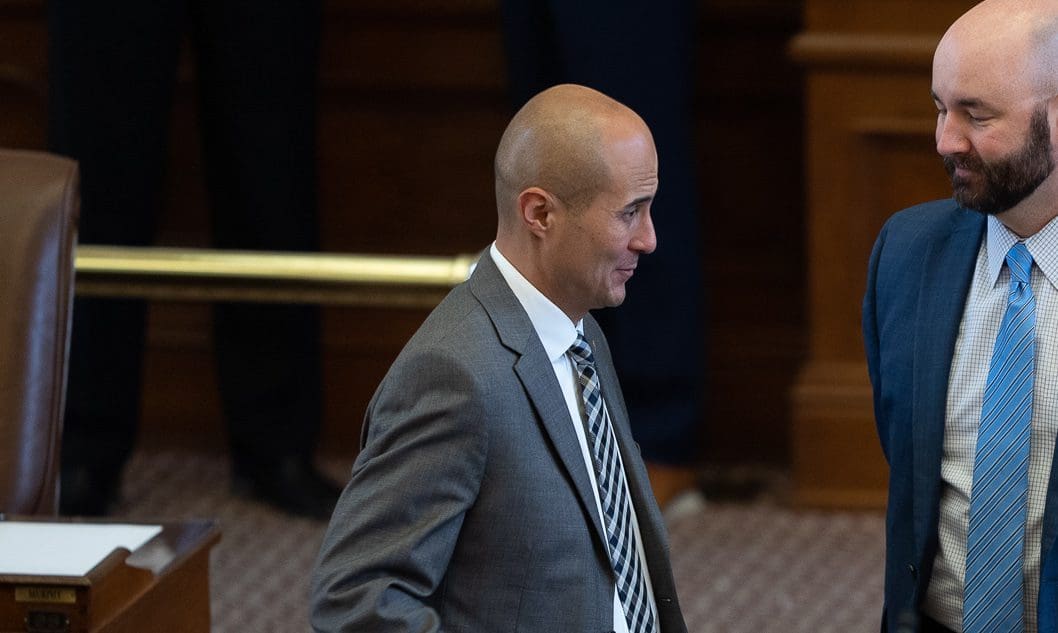MAY 17 UPDATE: Following outrage from election integrity activists, the bill was sent back to the Elections Committee.
ORIGINAL ARTICLE:
A high-profile piece of election integrity legislation is all but dead in the Texas House, with less than two weeks left in the legislative session.
Senate Bill 1070 by State Sen. Bryan Hughes (R–Mineola) passed the Texas Senate in April.
The legislation effectively bars Texas from participating in a controversial voter roll interstate crosscheck program, known as ERIC, by setting new cost limits and security requirements for any program used by the state.
Texas law requires the state to participate in a crosscheck program, but some GOP officials and election integrity advocates want the state to withdraw from ERIC due to concerns about the program’s costs, data security, and possible partisan access to voter data.
The legislation lagged, however, when it was sent to the House. After over a month of delay, it was scheduled for Tuesday’s calendar.
When the bill finally came up on the calendar, State Rep. Jacey Jetton (R–Richmond), the bill’s House sponsor, prepared to explain the bill. Almost immediately, State Rep. Mihaela Plesa (D–Dallas) raised a point of order—an objection on procedural grounds—stating that the bill analysis was inaccurate.
As is customary, a scrum of members gathered at the front dais—behind the scenes—to debate the merits of the point of order.
Speaker Dade Phelan, however, didn’t rule on the issue. Instead, Plesa withdrew her objection and allowed Jetton to make a motion to postpone the bill until July 28.
As the legislative session ends on May 29, this motion had the effect of killing the bill.
Jetton’s postponement also saved Phelan from having to issue an actual ruling on the point of order. Had he done so, the bill would be sent back to the House Elections Committee, where it still would have been possible—albeit within a tight timeline—to be brought back on the calendar in time for another vote.
It also prevented members from appealing—a motion that requires 10 members to object to the speaker’s ruling and call for a simple majority vote on whether to uphold it.
While the specifics of the point of order are unknown, Central Texas attorney Tony McDonald says it could be due to a new precedent implemented in the last few weeks by Phelan, under the direction of House parliamentarian Hugh Brady, barring factual references in the bill analysis.
“Until a few weeks ago, there had been all of three or four of these types of points of order ever sustained, and they were about errors in describing the bill. Over the last few weeks, Speaker Phelan, at Brady’s urging, has codified Brady’s manual for committee chairs as rule and has started killing bills,” said McDonald.
McDonald speculated the offending portion could be a part of the bill analysis that says “some say that the costs associated with ERIC participation have outweighed the benefits.”
As of publication, Jetton did not respond to a request for comment.
House rules do allow for a reconsideration of Jetton’s motion to postpone. Notice for that motion must be made one hour after the action. Since the House concluded their business less than one hour later, that means there will still be time in the early minutes of the House’s tomorrow to make the reconsideration motion.
The ERIC bill was just one of several casualties on Tuesday, as multiple bills were killed by points of order throughout the calendar. SB 1070 was marked as a Texas GOP priority bill.
The last day for the House to consider Senate bills is Tuesday, May 23.
No ads. No paywalls. No government grants. No corporate masters.
Just real news for real Texans.
Support Texas Scorecard to keep it that way!





